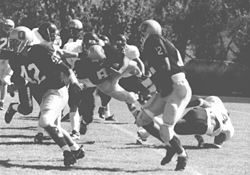

One of the biggest controversies on this campus has been the ongoing issue between the various club sports, including rugby, ultimate frisbee, ice hockey and intramural sports and the Athletic Department. Club sports members are upset and dissatisfied with the fact that they currently receive no aid from the Oberlin Athlete Training Department and its staff. Unless a student is a varsity athlete, he or she is taking a risk by signing up for an intramural team or joining a club sport.
Regardless of the seriousness of a student's injury, be it a torn ACL or a broken spine, the only hope of assistance or treatment a club sport member can receive will come from the first-aid kit issued to each team by Student Health - unless, that is, a teammate is available to drive them to the emergency room. All these club sport athletes want is the same coverage and treatment that varsity athletes receive from the athletic training department. It seems like a simple and realistic request, but their demands aren't being fulfilled. What is it that varsity athletes have that club sport athletes want so badly?

One major advantage of being an Oberlin College varsity athlete is the fact that such students have unlimited access to an athletic trainer, even if they sustain injuries that in no way were caused by participation in your sport. Currently, there are three certified athletic trainers at Oberlin. These trainers must take care of the needs of 10 men's and 11 women's varsity sport teams. Their assistance includes injury prevention, wound management (first-aid), rehabilitation, injury evaluation, scheduling doctors appointments and providing rides to the emergency room or other appointments. Athletic Trainers and/or their student athletic trainers are present and equipped with radio and medical kits at every game in case anything should happen to one of the players on either team.
Trainers have stated that it has not been their decision to prevent assistance to club sports. They say that all the decisions lie in the hands of more powerful individuals higher up on the totem pole. With their small staff it is very difficult during certain seasons for them to handle that enormous number of athletes and their needs. Club sport athletes can come in and help themselves to a bag or two of ice, but if the trainers offered any assistance at all they would risk not only their jobs, but the loss of their license. According to the trainers their state license prevents them from taking care of anyone other than varsity athletes.
So, if it isn't the trainers, then who is in control of this decision and what actions have been taken so far?
Beginning a few years ago some of the club sport athletes started to show concern for this issue. Athletes such as women's rugby players were very disturbed by the fact that they could not see a trainer. Take into consideration that rugby is one of the most dangerous sports, male or female. Because of the increasing number of injuries that have taken place on the rugby field, the team decided to address club sports liaison and men's baseball coach Eric Lahetta with the issue. Lahetta then spoke to many different people inside and outside the athletic department about the problem. Although many of the administrators failed to comment on the issue, Don Hunsinger - head coach of the men's and women's tennis teams and assistant coach of the women's basketball team - told us that Head Trainer Tim Carver and Director of Athletics Mike Muska are the only people who have really been dealing directly with the issue. He declined to comment on the situation because no one in the athletics department is really aware of what is going on and whether or not any advances have been made. Both Carver and Muska declined to comment on the issue.
Junior Kate Skillman, liaison and president of the women's rugby team, was very understanding of the College's position although she did not completely agree with it. "I understand the fact that the college can not assume liability, but I definitely feel that something is needed from them," said Skillman. She did express her appreciation for the fact that this year Student Health gave the club sports teams first-aid kits that can be replenished at any time. She also said, "That doesn't take the place of medical attention. I do not want to take time away from varsity athletes, but if personnel is a problem they should hire more trainers." Unfortunately, the trainers themselves said that even though the College brings in millions of dollars each year, there is no money to hire more trainers.
When we asked various varsity athletes what they felt about the situation, most of them were in support of the needs of club sports. Some of them were unaware of the problem, but still sympathized, recognized and supported their need for mutual medical assistance. This situation has not been resolved and there are still ongoing debates and discussions taking place. For now club sports and even intramural team will have to make do with the meager supplies they have available, but hopefully someday soon things will turn around and they will get everything they demand and deserve.
He's covered... are you?: If you play sports but aren't on a varsity team, such as football, you aren't eligible to recieve aid from the athletic trainers. The situation is currently provoking controversy. (photo by Brian Hodgkin)
Copyright © 1999, The Oberlin Review.
Volume 128, Number 11, December 3, 1999
Contact us with your comments and suggestions.